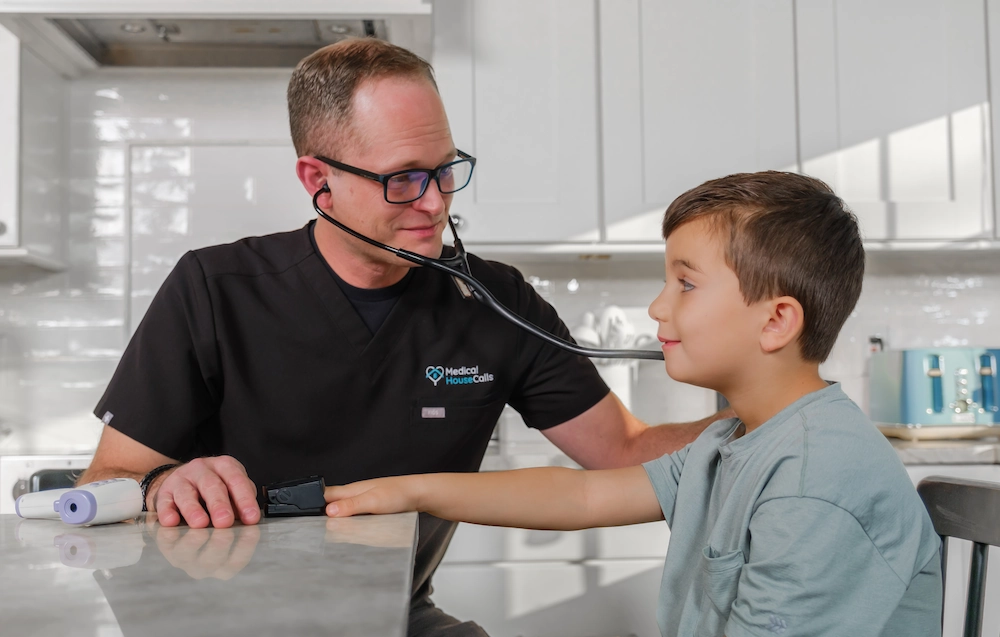Table of Contents
Sore Throat Solutions: Urgent Care at Your Doorstep
A sore throat can make you feel unmotivated while being anxious about the hassle of a clinic visit. But what if urgent care for sore throat relief could come to you instead?
Medical House Calls are transforming the way we think about urgent care, offering expert diagnosis and treatment for sore throats without leaving your home. Whether you need a quick strep test or comprehensive care, this service is designed to fit your busy life while prioritizing your comfort.

Urgent Care, Right at Home
Common Causes of a Sore Throat
Often caused by infections or environmental factors, below are the most common culprits:
- Viral Infections: Common colds, the flu, and mononucleosis are frequent triggers.
- Bacterial Infections: Streptococcal (strep throat) is a primary concern that requires medical attention to prevent complications.
- Allergies: Seasonal allergies or reactions to dust and pet dander can cause throat irritation.
- Dry Air: Low humidity levels, especially during winter, may lead to throat discomfort.
- Irritants: Smoking, pollutants, or exposure to chemical fumes.
- Reflux Conditions: Acid reflux or Gastroesophageal reflux disease (GERD).
Symptoms That Require Urgent Care
While most sore throats resolve on their own, some symptoms indicate the need for urgent medical attention:
- High Fever: Persistent fever over 101°F that doesn’t respond to over-the-counter medications.
- Difficulty Swallowing or Breathing: This could indicate severe infection or swelling.
- Swollen Lymph Nodes: Significant or painful swelling under the jaw or in the neck area.
- White Patches or Pus in the Throat: A sign of bacterial infection, such as strep throat or tonsillitis.
- Prolonged Sore Throat: Lasting more than a week without improvement.
- Rash or Joint Pain: Could signal a more serious condition, such as scarlet fever.
Treatment Options Available in Urgent Care
When it comes to treating a sore throat, urgent care offers efficient and personalized options:
- Rapid Diagnostic Tests: Instant strep throat tests or throat cultures to identify bacterial infections.
- Prescription Medications: Prescribed antibiotics for bacterial infections or antiviral drugs for flu-related symptoms.
- Symptom Management: Recommendations for soothing sore throats with pain relievers, throat lozenges, or hydration techniques.
- On-Site Procedures: For severe cases, such as abscess drainage or breathing assistance, Medical House Calls are equipped to provide immediate relief.
When to Seek Medical Attention
A sore throat might be a minor inconvenience, but certain symptoms signal it’s time to call a medical professional:
- Severe Pain or Swelling: If swallowing or speaking becomes too painful, it’s time for expert evaluation.
- High or Prolonged Fever: A temperature over 101°F lasting more than two days could indicate an infection.
- Difficulty Breathing: All signs of airway obstruction require immediate medical attention.
- Visible White Patches or Pus: These are often signs of bacterial infections like strep throat, which require treatment.
- Unrelated Symptoms: Joint pain, rashes, or a sore throat lasting more than a week warrant professional care.
Diagnostic Tests and Procedures
Accurate diagnosis is key to effective treatment. When you opt for a Medical House Calls, healthcare providers bring the tools to perform essential tests in your home:
- Rapid Strep Test: A swab of the throat determines if a bacterial infection is present, providing results in minutes.
- Throat Culture: For cases where an in-depth analysis is needed, throat cultures can identify the cause of a sore throat.
- Symptom Assessment: An evaluation of your symptoms, medical history, and environment to rule out other conditions like allergies or reflux.
House-call services combine advanced diagnostic capabilities with the convenience of personalized care at your doorstep, sparing you the hassle of travel.
Medication Prescriptions and Over-the-Counter Options
Once the condition is diagnosed, tailored treatment begins at once:
Prescription Medications
- Antibiotics: If bacterial infections like strep throat are confirmed.
- Antiviral Medications: To combat flu or other viral causes of sore throat.
- Anti-Inflammatory Drugs: For swelling or pain relief.
Over-the-Counter Relief
- Recommendations for throat lozenges, pain relievers like ibuprofen, and hydration tips to soothe discomfort.
- Advice on using saline gargles or humidifiers for extra relief.
With Medical House Calls, prescriptions can be sent to your pharmacy, ensuring a hassle-free treatment—no waiting rooms required.

Home Remedies for Sore Throat Relief
Below are descriptions of remedy examples:
- Salt Water Gargle: Mix 1/2 teaspoon of salt in 8 ounces of warm water. Gargle several times a day to reduce swelling and flush out irritants.
- Stay Hydrated: Drink plenty of water to keep your throat moist. Warm liquids like herbal teas or broth can provide added comfort.
- Honey: Add honey to warm water or tea. Its natural antibacterial properties coat the throat and reduce discomfort.
- Steam Inhalation: Inhale steam from hot water or use a humidifier to ease dryness and soothe irritation.
- Herbal Teas: Chamomile tea reduces inflammation; peppermint tea relieves pain and opens nasal passages.
- Cold or Warm Compress: Apply a warm or cool compress to the neck to reduce discomfort and swelling.
- Rest Your Voice: Limit speaking to allow your throat time to recover. Avoid whispering or shouting, as they can strain your voice.
- Lozenges/Hard Candy: Suck on lozenges or sugar-free hard candy to stimulate saliva and keep your throat moist.
- Apple Cider Vinegar: Mix 1 tablespoon of apple cider vinegar with warm water and honey for antibacterial effects.
- Avoid Irritants: Steer clear of smoke, pollutants, or strong odors that could aggravate your throat.
Preventative Measures to Avoid Recurrence
- Practice Good Hygiene: Wash your hands often. Avoid sharing utensils, cups, or personal items, especially during cold and flu season.
- Boost Immunity: To strengthen your immune system, eat a balanced diet rich in fruits and vegetables, get adequate sleep, and manage stress levels.
- Stay Hydrated: Drink water to keep your throat and mucous membranes moist and healthy.
- Use a Humidifier: Keep indoor air moist, especially during winter, to prevent throat dryness and irritation.
- Avoid Irritants: Refrain from smoking, secondhand smoke, and other pollutants.
- Manage Allergies: Take prescribed medications to reduce throat irritation caused by allergens such as pollen or dust.
- Stay Active: Regular physical activity strengthens your immune system and wellness.
- Limit Exposure to Unwell Individuals: Avoid close contact with people who have colds or flu, especially during peak seasons.
- Get Vaccinated: Stay up-to-date on flu shots and other vaccinations to reduce the possibility of infections.
- Protect Your Voice: Avoid overusing or straining your voice, and practice proper speaking techniques.
Incorporating these measures can reduce the possibility of recurring sore throats. For persistent concerns, Medical House Calls provides expert care in your home at your convenience.
Follow-Up Care and Recommendations
Effective follow-up care ensures complete recovery and reduces the risk of complications. Here’s what to consider:
- Complete Prescribed Treatment: Finish any medications, such as antibiotics or antivirals, as directed by your healthcare provider, even if you start feeling better.
- Monitor Symptoms: Watch for any changes in your condition, such as worsening pain, difficulty swallowing, or fever. If symptoms persist or escalate, seek medical advice promptly.
- Hydration and Nutrition: Continue to drink plenty of water and consume soft, nutritious foods to support recovery and maintain energy levels. Avoid irritants like spicy or acidic foods.
- Rest and Recovery: Allow your body to heal by getting adequate rest and avoiding strenuous activities until you feel fully recovered.
- Follow Preventative Measures: Implement preventative strategies, such as good hygiene and staying hydrated, to minimize the chances of recurrence.
- Scheduled Follow-Up: If symptoms don’t resolve or if additional care is needed, consider a follow-up visit with a healthcare provider. Medical House Calls are a convenient option for personalized follow-up without leaving your home.
- Voice Care: If your sore throat was caused by overuse, rest your voice and speak softly to allow your throat to heal completely.
- Lifestyle Adjustments: Address lifestyle factors, such as quitting smoking or managing allergies, that may have contributed to your sore throat.
Summary
Sore throats are a common health issue that can stem from various causes, including infections, allergies, or vocal strain. While many cases resolve on their own, some symptoms may require medical attention to prevent complications. Recognizing when to seek help and understanding available treatment options are essential for effective management.
Home remedies like honey, saltwater gargles, and IV hydration can provide immediate relief, while preventative measures, such as practicing good hygiene and avoiding irritants, help reduce the risk of recurrence. Follow-ups, including completing prescribed treatments and monitoring symptoms, ensure full recovery.
For a convenient and personalized approach to care, Medical House Calls offers professional diagnosis, treatment, and follow-up in the comfort of your home. This service eliminates the need to visit a clinic, making it ideal for individuals seeking expert care without the hassle of travel.
By combining home remedies, preventative strategies, and professional care through medical house calls, you can manage sore throats effectively and focus on maintaining your well-being.
Unlimited Urgent Care House Calls








